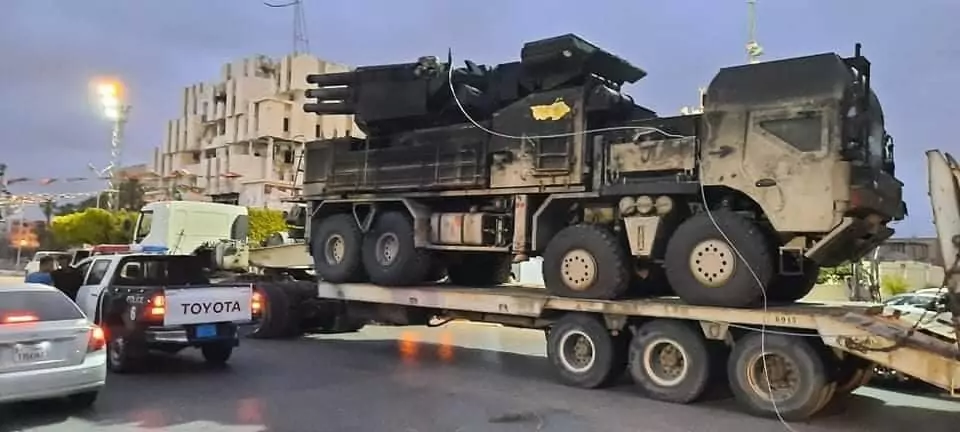
Moscow-Supported Forces Besieging Tripoli Retreat
Publication: Eurasia Daily Monitor Volume: 17 Issue: 72
By:

Russian President Vladimir Putin has been seeking to return to Libya since 2003, when United Nations sanctions on the country were dropped after Muammar Qaddafi made amends to the West, denounced terrorism, abandoned plans to produce weapons of mass destruction and allocated $2.7 billon to pay the families of victims of the 1988 Lockerbie bombing of Pan Am Flight 103. In the 1970s and 1980s, Qaddafi’s Libya was a close partner and a mass purchaser of Soviet weapons, paying in petrodollars. In 1992 and 1993, the government of then-president Boris Yeltsin supported UN Security Council sanctions against Libya. Many in the Russian military, diplomatic, intelligence, and arms trading establishments saw this as an act of betrayal of an old ally—moreover, one costing tens of billions of dollars in lost revenue. As Putin began his quest to rebuild Russia to a level of “greatness” lost after the collapse of the Soviet Union, returning to Libya became a distinct priority. Yet, Russia only began reinvesting in Libya after 2011, when a popular uprising—supported by the North Atlantic Treaty Organization’s (NATO) UN-approved air campaign—overthrew the regime and the country collapsed into a chaotic civil war (see EDM, January 23, 2020). Russian Foreign Minister Sergei Lavrov has, time and again, denounced NATO, which, he asserted, “shattered the Libyan state in 2011 in the course of a criminal and illegal intervention” (Izvestia January 14, 2020).
The Russian Ministry of Defense, led by Army General Sergei Shoigu, has been seeking to reestablish a foothold in Libya by cultivating ties with Libyan strongman Khalifa Haftar (76)—a self-proclaimed field marshal and the commander of the Libyan National Army (LNA), which controls a large portion of the country. Since April 2019, LNA forces have been besieging the capital Tripoli, the main base of the UN-recognized Government of National Accord (GNA). Numerous reports have circulated in recent years about a sizable force of Russian military contractors or mercenaries fighting for Haftar—soldiers and specialists with combat experience in Donbas and Syria, allegedly associated with the private military company (Chastniya Voennaya Companiya— ChVK) Wagner Group. A recent UN report confirmed the presence of 800–1,200 Wagner mercenaries in Libya in league with the LNA. According to Turkish President Recep Tayyip Erdoğan—who supports Haftar’s main opponent, GNA Prime Minister Fayez al-Serraj—there are some 2,000 Wagner fighters as well as around 5,000 mercenaries from Sudan, Niger and Chad deployed in Libya (Rosbalt, May 7). Moscow’s permanent representative to the United Nations, Vasiliy Nebenzya, dismissed the UN’s Libya report as “mostly based on false or unproven information and intended to discredit Russia.” But in January 2020, Putin pointedly did not deny the Wagner presence, though he insisted, “They are not acting in the Russian state’s interests, and we do not finance them.” Reportedly, there are also fighters from Syria in Libya, both with the LNA and the GNA (Militarynews.ru, May 19).
According to Turkish Defense Minister Hulusi Akar, the deployment (beginning in January) of Turkish military advisors in support of the GNA has changed the course of the civil war in Libya (Anadolu Agency, May 20). The LNA has suffered a number of setbacks, retreating in disarray from important positions south and west of Tripoli. Media reports assert that up to three Russian-made Pantsir-S1 (SA-22 Greyhound) anti-aircraft systems were destroyed together with a modern Russian-made Krasukha electronic warfare (EW) multifunctional jamming station. The Pantsir-S1s and the Krasukha were used by the LNA to disable and shoot down Turkish attack/reconnaissance drones. Apparently, the Turks managed to hit back (Moskovsky Komsomolets, May 19). GNA forces, supported by Turkish attack drones, have taken the strategically important al-Watiyah airbase southwest of Tripoli, capturing a number of mostly mothballed Soviet-made Qaddafi-era military equipment, but also a visibly intact Pantsir-S1 system that was later paraded through the streets of Tripoli. The captured Pantsir-S1 is a downgraded “export” version of the system built in Russia and shipped to Abu Dhabi (United Arab Emirates—UAE), which delivered it to the LNA. Abu Dhabi has been sending the LNA weapons, military advisors and, reportedly, hiring foreign mercenaries on Haftar’s behalf. It is not clear whether the Pantsir-S1s in Libya are manned by UAE military specialists or Russian Wagner operatives (Vzglyad, May 20). Also unclear is from where the EW station was shipped to the LNA and whether it is an analog Krasukha-2 or a more advanced digital Krasukha-4, as deployed by Russians in Syria.

According to the state-run Turkish Anadolu Agency, some eight jets (six MiG-29 fighters and two Su-24 bombers) flew to LNA bases from the Russian Hmeimim airbase in Syria. The LNA has threatened to bomb Turkish forces and interests in Libya, but Turkey has promised to hit back (Anadolu Agency, May 21). According to Russian experts, Turkey has deployed several G-class (Gabya) frigates (extensively modernized former Oliver Hazard Perry–class guided-missile frigates of the United States Navy), mainly designed for air defense. Apparently, the Turkish frigate’s anti-air capabilities have been dominating the airspace over the Tripoli region, knocking down Chinese-built Wing Loong II attack drones used by the LNA (provided by Abu Dhabi). With the Turks dominating the skies, the LNA has been losing ground (Rossyskaya Gazeta, May 21).
Haftar has reportedly been withholding payment to ChVK Wagner—in arrears to the tune of $150 million. At a summit in Istanbul, on January 8, 2020, Putin and Erdoğan worked out an indefinite ceasefire between the GNA and LNA. Wagner fighters, under orders from Moscow, have since scaled down frontline fighting—only providing the LNA with technical expertise to help keep Russian-made weapons operational. And in retaliation, Haftar is freezing pay (Rambler, May 15). Both Haftar and al-Serraj were summoned to Moscow on January 13 to sign a permanent ceasefire agreement. The GNA’s prime minister signed, but the field marshal refused, publicly snubbing the Kremlin leader (see EDM, January 23). Shoigu and the Russian military are apparently still backing Haftar, but the Kremlin and the foreign ministry are less enthusiastic (Gazeta.ru, May 16).
Moscow certainly wants to return to Libya, with the help of Haftar or without. If Haftar’s attempt to oust al-Serraj has failed, the Kremlin may figure it is time for a real ceasefire and will seek a balance between internal Libyan armed tribes and external forces: Turkey, Qatar, Algeria, Tunisia and Italy, which support al-Serraj, versus Egypt, Abu Dhabi, Russia, Greece, Saudi Arabia and France, which back Haftar. On May 18, Putin and Erdoğan discussed Libya on the phone and expressed concern about the continuing escalation. Notably, according to the Kremlin, the two sides reiterated the need for a permanent ceasefire (TASS, May 18).



